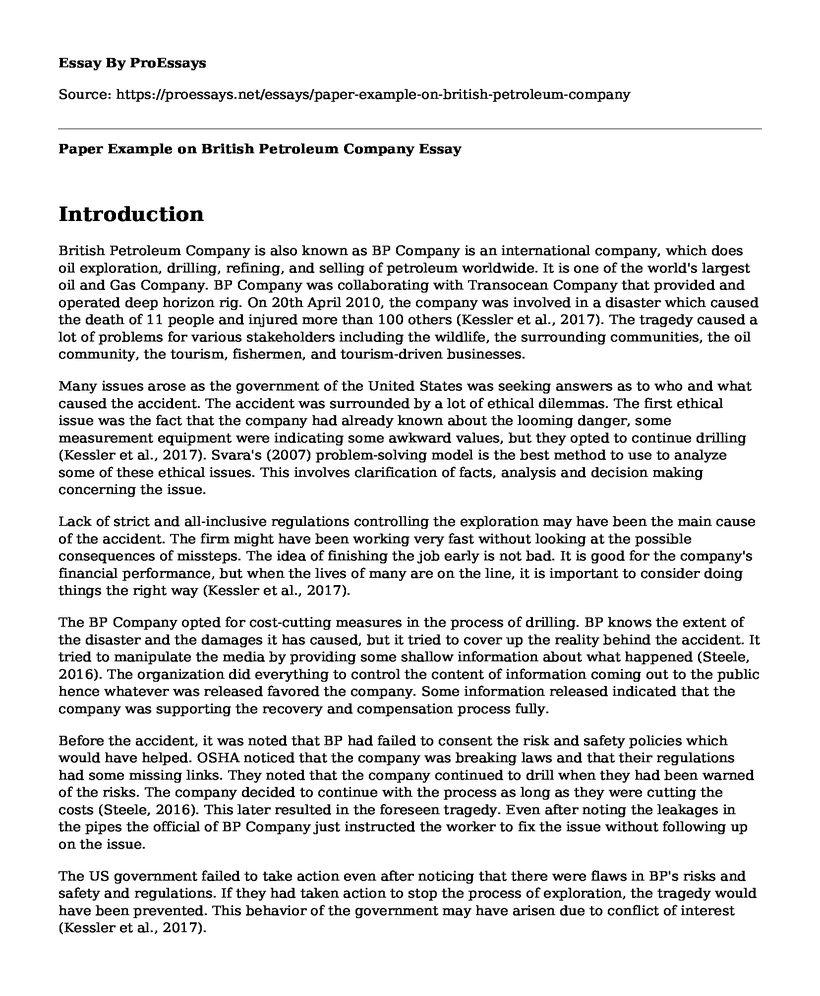Introduction
British Petroleum Company is also known as BP Company is an international company, which does oil exploration, drilling, refining, and selling of petroleum worldwide. It is one of the world's largest oil and Gas Company. BP Company was collaborating with Transocean Company that provided and operated deep horizon rig. On 20th April 2010, the company was involved in a disaster which caused the death of 11 people and injured more than 100 others (Kessler et al., 2017). The tragedy caused a lot of problems for various stakeholders including the wildlife, the surrounding communities, the oil community, the tourism, fishermen, and tourism-driven businesses.
Many issues arose as the government of the United States was seeking answers as to who and what caused the accident. The accident was surrounded by a lot of ethical dilemmas. The first ethical issue was the fact that the company had already known about the looming danger, some measurement equipment were indicating some awkward values, but they opted to continue drilling (Kessler et al., 2017). Svara's (2007) problem-solving model is the best method to use to analyze some of these ethical issues. This involves clarification of facts, analysis and decision making concerning the issue.
Lack of strict and all-inclusive regulations controlling the exploration may have been the main cause of the accident. The firm might have been working very fast without looking at the possible consequences of missteps. The idea of finishing the job early is not bad. It is good for the company's financial performance, but when the lives of many are on the line, it is important to consider doing things the right way (Kessler et al., 2017).
The BP Company opted for cost-cutting measures in the process of drilling. BP knows the extent of the disaster and the damages it has caused, but it tried to cover up the reality behind the accident. It tried to manipulate the media by providing some shallow information about what happened (Steele, 2016). The organization did everything to control the content of information coming out to the public hence whatever was released favored the company. Some information released indicated that the company was supporting the recovery and compensation process fully.
Before the accident, it was noted that BP had failed to consent the risk and safety policies which would have helped. OSHA noticed that the company was breaking laws and that their regulations had some missing links. They noted that the company continued to drill when they had been warned of the risks. The company decided to continue with the process as long as they were cutting the costs (Steele, 2016). This later resulted in the foreseen tragedy. Even after noting the leakages in the pipes the official of BP Company just instructed the worker to fix the issue without following up on the issue.
The US government failed to take action even after noticing that there were flaws in BP's risks and safety and regulations. If they had taken action to stop the process of exploration, the tragedy would have been prevented. This behavior of the government may have arisen due to conflict of interest (Kessler et al., 2017).
Conclusion
Some of the lessons which can be learned from this incident are that it is important to make and implement all safety regulations when dealing with oil. Any process involving oil should be undertaken with a lot of care. It is also important that the government oversees all the process involving oil from exploration to refining stage. The government and other environmental organizations should also monitor oil drilling. They should monitor the operation of the drilling company every day to ensure that all the processes are done according to the regulations.
References
Kessler, S. R., Mahoney, K. T., Randolph-Seng, B., Martinko, M. J., & Spector, P. E. (2017). The Effects of Attribution Style and Stakeholder Role on Blame for the Deepwater Horizon Oil Spill. Business & Society, 0007650317717495.
Steele, G. A. (2016). Environmental Conflict and Media Coverage of an Oil Spill in Trinidad. Negotiation and Conflict Management Research, 9(1), 60-80.
Cite this page
Paper Example on British Petroleum Company. (2022, Jun 30). Retrieved from https://proessays.net/essays/paper-example-on-british-petroleum-company
If you are the original author of this essay and no longer wish to have it published on the ProEssays website, please click below to request its removal:
- The Men vs. Women Challenge Campaign by Nike
- Essay Sample on Amazon and Its Marketing Innovations
- Essay Sample on Walmart: World's Largest Retailer with Record Sales, Profitable Discounts
- Paper Example on Uber: Transforming Mobility Across 50 Countries
- Nike Addresses Moral Hazard Problems: Labor Standards to Resolve - Essay Sample
- Essay Sample on Amazon Withdraws from Chinese Market after 16 Years of Struggle
- Walmart Leverages Global Supply Chain Strategies for Global Reach Essay Example







